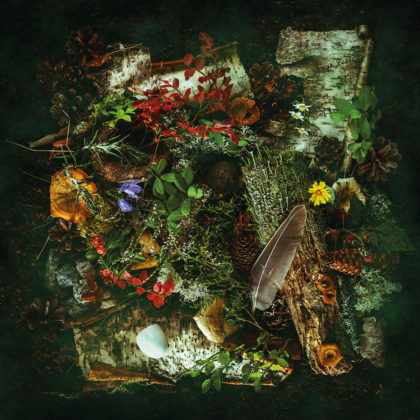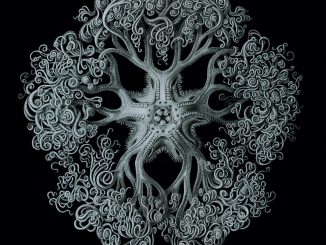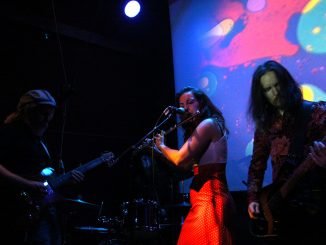[Kommun 2, 2021]

Intro: Panagiotis Stathopoulos
The progressive rock of the late 60s / early 70s has experienced (and still experiences) a second youth since the first half of the 10s and this positive development is mainly due to the Scandinavian scene. One of those bands is the collective of Agusa from Malmö, that started in 2013 and since then has released 3 studio and 3 live albums.
From this fully instrumental musical harvest, the first two LPs of the band stand out, especially 2014’s Högtid and the Två that followed. In these releases, the band created an admirable and exciting series of moments that place the rock nerve euphorically and gracefully next to the bucolic, mystic and pagan aura of the rural areas of Sweden. Trippy guitars and keyboards found a melodic pillar in the flute and all together they dressed our ears magically.
Their latest full-length album that came out in 2017 bearing their name found the band in a downward orbit. The charm of their mystic harmonies is still there, but the surprises in the development were very few.
This year’s En Annan Värld finds Agusa with two lineup changes (Simon Ström replaced Tobias Petterson on bass guitar, and Roman Andrén replaced Jonas Berge on keys) and with an appetite to push their project to new directions.
[bandcamp width=100% height=120 album=1437169501 size=large bgcol=ffffff linkcol=0687f5 tracklist=false artwork=small]
Not really fresh but enjoyable in the end
With the aforementioned lineup changes since 2017 and given the fact that their self-titled album showed declining trends in the dynamic and their inspiration, you would expect a different approach in the content Agusa’s newest album entitled En Annan Värld. Instead, the two compositions that make this record, their exchange and functionality transport us straight in instances from the band’s lineage and by extension in hubs of symphonic and folk rock of 1970s progressive rock. The melodic surfaces that the flute is coming up with are are combined with the rough guitar distortions and the imposing frequencies of the keyboards (hammond and other electronic keyboards).
The atmosphere of the album is getting built moment by moment, with the details here and there comprising a whole that may not have too many surprises, but it leaves room for the emotional loads to rise. Such an evolution shakes the atmosphere when, for example, right before the middle of the starter Sagobrus, flute, guitar and a rhythmic scale indulge in a carousell of traditional Swedish sounds and rock, while later on we have an ignition of a sensitivity from the hammond solo, the odes from the flute and the psychedelic guitars. It’s a very organic instrumental discussion that passes with a very idyllic way through the streets of Harmonium, Camel, Jethro Tull, Out of Focus, Kebnakaise and Änglagård.
25 minutes later, the gravity is somewhat blissfully lessened and we have a “space is the place” for everyone with trembling vibes from the hammond organ, the flute and the guitar creating an ethereal lyricism for an uninterrupted 10-minute stretch, until the floating guitar and the hallucinogenic keyboards come to the front. All that until the poetic chords of the acoustic guitar and the enthusiastic flute take charge like inactive battered captains. This is one of the most honey-dripping postcards of the year. Floyd, King Crimson and Ragnarök stand out from the crew…
In the end, En Annan Värld is nothing more than a sonic travel back to where the natural joy is palpable and the prospect of a life far away from here works liberatingly, far way from any urban constraint.
8 / 10
Panagiotis Stathopoulos
2nd opinion
The fourth studio album of Agusa, four years after their self-titled album that I had found weaker than the first two due to its overly jamming character, the quintet from Malmö is back with two line-up changes and the two side-song recipe that they had followed in Två (2015). In En Annan Värld, the music is once again deeply rooted in the early 70s with the commune spirit and the staggered development of themes (both songs last more than 20 minutes) highlighting the wonderful progressive / psych / folk rock of Agusa, exuding calmness, openness and above all persuasiveness. Sagobrus is by itself a reason for someone to listen and love this music, a sensational epic with an exciting development, indulgently rich in inspiration with sweet phrases as a homage to Camel. Undoubtedly, it’s one of the peak moments of Agusa until today and of course one of the best songs of the year. The more calm and ethereal and also exceptional Uppenbarelser is almost a surprise, exploring the more psychedelic side of the band, starting acoustically and ending in a more classically inspired theme that is built flawlessly, closing one of the best albums of the year.
8.5 / 10
Dimitris Kaltsas
[Kommun 2, 2021]

Εισαγωγή: Παναγιώτης Σταθόπουλος
To προοδευτικό rock των τελών ‘60s / αρχών ’70s έζησε (και ζει ακόμη) μια δεύτερη νιότη από το πρώτο μισό των ‘10s και αυτή η καλοδεχούμενη εξέλιξη οφείλεται εν πολλοίς στα όσα συμβαίνουν στο ανάλογο ηχητικό τερέν των σκανδιναβικών χωρών. Μέσα σε αυτό, διακρίθηκε η κολεκτίβα των Agusa από το σουηδικό Malmö, που πάτησε το κουμπί της εκκίνησης το 2013 για να εκδώσει έκτοτε τρία στουντιακά έργα και ισάριθμα που αποτυπώνουν τις επιδόσεις της ενώπιον κοινού.
Από την εν λόγω η συγκομιδή καθ’ ολοκληρία instrumental ηχητικών συλλήψεων, ξεχωρίζουν τα δύο πρώτα LP του σχήματος, κυρίως το Högtid του 2014 και το αμέσως επόμενο Två. Εντός τους, το γκρουπ έπλασε μια θαυμαστή και καθόλα συναρπαστική αλληλουχία στιγμιότυπων που τοποθετούν ευφορικά ισορροπημένα το rock νεύρο πλάι στην βουκολική, μυστικιστική και εν τέλει παγανιστική αύρα της υπαίθρου του τόπου του. Τριπαριστές κιθάρες και πλήκτρα βρήκαν μελωδικό αποκούμπι στο φλάουτο και από κοινού πέρασαν μια μαγική φορεσιά στις ακροάσεις μας.
Το τελευταίο full-length άλμπουμ των Agusa τιτλοφορήθηκε μονάχα με το όνομά τους και κυκλοφόρησε το 2017, απαθανατίζοντας ένα συγκρότημα σε καθοδική τροχιά. Η σαγήνη των μυσταγωγικών αρμονιών τους δεν λείπει, αλλά οι εκπλήξεις στις αναπτύξεις τους λιγόστεψαν σε μεγάλο βαθμό.
Το φετινό En Annan Värld τούς βρίσκει με δύο αλλαγές μελών (το μπάσο περνάει από τον Tobias Petterson στον Simon Ström, ενώ τα πλήκτρα από τον Jonas Berge στον Roman Andrén) και με διάθεση να σπρώξουν εγχείρημά τους σε νέες διαδρομές.
[bandcamp width=100% height=120 album=1437169501 size=large bgcol=ffffff linkcol=0687f5 tracklist=false artwork=small]
Ηχητικό πρόσωπο όχι ακριβώς φρέσκο αλλά (επιτέλους) απολαυστικό
Με την προαναφερθείσα μεταβολή στο lineup των Agusa από το 2017 και δεδομένου ότι το φερώνυμό τους άλμπουμ μαρτύρησε πτωτικές τάσεις στην δυναμική και τον αντίκτυπο των εμπνεύσεών τους, θα περίμενε κανείς και μια αλλιώτικη προσέγγιση στο περιεχόμενο του πλέον πρόσφατου τους δίσκου ονόματι En Annan Värld. Αντ’ αυτού, οι δύο συνθέσεις που τον απαρτίζουν αλλά και η μεταξύ τους εναλλαγή και λειτουργικότητα μάς μεταφέρουν απευθείας σε παραστάσεις από την έως τώρα πορεία του γκρουπ και κατ’ επέκταση σε κομβικά σημεία του συμφωνικού αλλά και του folk τμήματος του προοδευτικού rock των ’70s. Οι δε μελωδικές επιφάνειες που σκαρφίζεται το φλάουτο τραχύνονται από τα περάσματα παραμόρφωσης της κιθάρας και τις υποβλητικές συχνότητες των πληκτροφόρων (hammond και λοιπών ηλεκτρονικών keyboard).
Το κλίμα του άλμπουμ χτίζεται στιγμή τη στιγμή, με τις λεπτομέρειες εδώ και εκεί να συγκροτούν μια ολότητα που μπορεί να μην επιφέρει πολλές εκπλήξεις αλλά αφήνει συγκινησιακά φορτία να αναδειχτούν. Μια τέτοια εξέλιξη δονεί την ατμόσφαιρα όταν, φερειπείν λίγο πριν τη μέση του εναρκτήριου Sagobrus, φλάουτο, κιθάρα και ρυθμικό σκέλος επιδίδονται σε ένα γαϊτανάκι μεταξύ σουηδικών παραδοσιακών απόηχων και rock, ενώ λίγο αργότερα πυροδοτείται μια αισθαντικότητα από το σόλο του hammond, τις ωδές του φλάουτου και τις ψυχεδελικές κιθαριστικές ριπές. Πρόκειται για μια καθόλα οργανική συνομιλία, δηλαδή δίχως λεκτικό έρεισμα, η οποία περνάει με ειδυλλιακό τρόπο από τις οδούς των Harmonium, Camel, Jethro Tull, Out of Focus, Kebnekaise και Änglagård.
25 λεπτά μετά, η βαρύτητα κάπως, κάπου μειώνεται ευδαιμονικά κι έχουμε ένα “space is the place”, για όλους ανεξαιρέτως, με τα τρεμάμενα vibes από το hammond, το φλάουτο και την κιθάρα να διαμορφώνουν ένα αιθέριο λυρισμό για ένα αδιάλειπτο δεκάλεπτο, ως ότου η αιωρούμενη κιθάρα και τα παραισθητικά πλήκτρα έρθουν στο προσκήνιο. Κι αυτό το «έπειτα», όπου τα ποιητικά αρπίσματα της ακουστικής κιθάρας και το ενθουσιώδες φλάουτο πάρουν τα ηνία σαν θαλασσοδαρμένοι καπετάνιοι σε απραξία, αποτελεί μια από τις πλέον μελίρρυτες καρτ ποστάλ της χρονιάς. Οι Floyd, οι King Crimson και οι Ragnarök ξεχωρίζουν μέσα στο πλήρωμα…
To En Annan Värld, τελικά, δεν είναι τίποτα άλλο από ένα ηχο-πορικό επιστροφής εκεί που πάλλεται η χαρά της φύσης και η προοπτική μιας ζωής πολύ έξω από εδώ λειτουργεί απελευθερωτικά, πέρα από οποιοδήποτε αστικό περιορισμό.
8 / 10
Παναγιώτης Σταθόπουλος
2η γνώμη
Το τέταρτο studio album των Agusa, τέσσερα χρόνια μετά τον ομώνυμο δίσκο τους που προσωπικά δεν με ενθουσίασε με τον υπερβολικά jamming χαρακτήρα του, το κουιντέτο από το Malmö επιστρέφει με δύο αλλαγές στη σύνθεση στη συνταγή των δύο side songs που είχε ακολουθήσει στο Två (2015). Στο En Annan Värld η μουσική παραμένει βαθιά ριζωμένη στα πρώιμα 70s, με το κοινοβιακό πνεύμα και τις κλιμακωτές αναπτύξεις των θεμάτων (και τα δύο κομμάτια διαρκούν πάνω από 20 λεπτά) να αναδεικνύουν το υπέροχο progressive / psych / folk rock των Agusa αποπνέοντας χαλαρότητα, ειλικρίνεια και πάνω απ’ όλα πειστικότητα. Το Sagobrus είναι από μόνο του ένας λόγος να ακούει και να αγαπά κανείς αυτή τη μουσική, ένα συγκλονιστικό epic με συναρπαστική εξέλιξη, πλούτο επιεικώς εμπνευσμένων ιδεών και γλυκύτατες φράσεις ως φόρο τιμής στους Camel. Αναμφισβήτητα είναι μία από τις κορυφαίες στιγμές των Agusa μέχρι σήμερα και φυσικά ένα από τα καλύτερα κομμάτια της χρονιάς. Το πιο ήπιο και αιθέριο, επίσης εξαιρετικό Uppenbarelser αποτελεί σχεδόν έκπληξη, εξερευνώντας την πιο ψυχεδελική πλευρά της μπάντας ξεκινώντας ακουστικά και καταλήγοντας σε ένα κλασικότροπο θέμα που χτίζεται άψογα, κλείνοντας έτσι έναν από τους κορυφαίους δίσκους της χρονιάς.
8.5 / 10
Δημήτρης Καλτσάς




